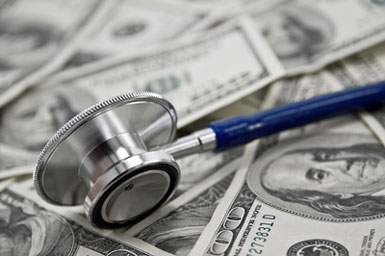It’s no secret that excessive stress of any kind can take a toll on your health. But financial stress can be especially damaging as it can have a number of secondary effects across all facets of life.
Take a look at the potential health risks of financial stress and start taking steps to manage them. 
Cutting Corners on Food
Trying to make ends meet often means healthy eating takes a back seat to buying food that is cheap and filling. Unfortunately, this can lead to long-term health issues caused by too much processed food and not enough fresh fruits and vegetables.
A Better Way – You can stretch your food budget to include healthy, fresh foods by:
- Shopping with coupons and money-saving apps
- Establishing and sticking to a food budget
- Cooking meals at home
- Getting involved in a local co-op or CSA share
Using Negative Coping Behaviors
Drinking alcohol, smoking, or overeating as responses to financial stress are not uncommon, but they are unhealthy. All of these so-called stress relievers are only short-term fixes that mask the real issue. Plus, they can be expensive and cost you more in the long run in the form of higher insurance premiums and health care costs.
A Better Way – Try healthier outlets for stress management, such as:
- Exercise – Even a quick walk around the block can calm your nerves and clear your head
- Conversation – Talking things out with a supportive friend or family member can help you determine your options
- Get Creative — Try writing in a journal, sketching, painting or other creative pursuits to channel excess stress
Losing Sleep
Few things can keep you up at night like wondering how you’re going to pay all the bills this month. Not getting enough sleep can have a number of negative health effects. These can include weight gain, inability to concentrate and weakened immunity.
A Better Way – Prepare yourself for a good night’s sleep by:
- Limiting consumption of caffeine, nicotine and alcohol
- Not using your cell phone, laptops or tablets in bed
- Creating a restful, clutter-free space
Withdrawing from Family & Friends
Financial stress can lead to feelings of hopelessness and depression and cause you to isolate yourself from the people you need most in your life.
A Better Way – Get free help to get back on track. Nonprofit credit counseling will help you:
- Determine the total amount of debt you owe
- Develop a budget and stick to it
- Make a plan to pay off debt
- Avoid incurring additional debt





